生活英语中常犯错的十个句子
初中英语作文常犯的十大语法错误总结
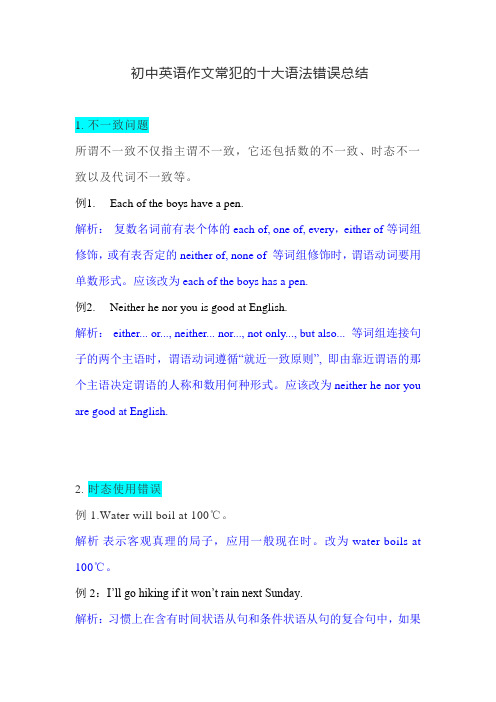
初中英语作文常犯的十大语法错误总结1. 不一致问题所谓不一致不仅指主谓不一致,它还包括数的不一致、时态不一致以及代词不一致等。
例1.Each of the boys have a pen.解析:复数名词前有表个体的each of, one of, every,either of等词组修饰,或有表否定的neither of, none of 等词组修饰时,谓语动词要用单数形式。
应该改为each of the boys has a pen.例2.Neither he nor you is good at English.解析:either... or..., neither... nor..., not only..., but also... 等词组连接句子的两个主语时,谓语动词遵循“就近一致原则”, 即由靠近谓语的那个主语决定谓语的人称和数用何种形式。
应该改为neither he nor you are good at English.2.时态使用错误例1.Water will boil at 100℃。
解析表示客观真理的局子,应用一般现在时。
改为water boils at 100℃。
例2:I’ll go hiking if it won’t rain next Sunday.解析:习惯上在含有时间状语从句和条件状语从句的复合句中,如果主句的谓语动词用了一般将来时,从句的谓语动词要用一般现在时表示将来的动作。
应该改为:I’ll go hiking if it doesn’t rain next Sunday.例3:Teacher told us yesterday that the earth went around the sun.解析:习惯上在含有宾语从句的复合句中,主句的谓语动词用了一般过去时,从句的谓语动词要用过去的某种时态。
但如果从句表述的是一客观事实或客观真理时,则不受主句时态的影响,而用一般现在时。
生活英语中常犯错的十个句子
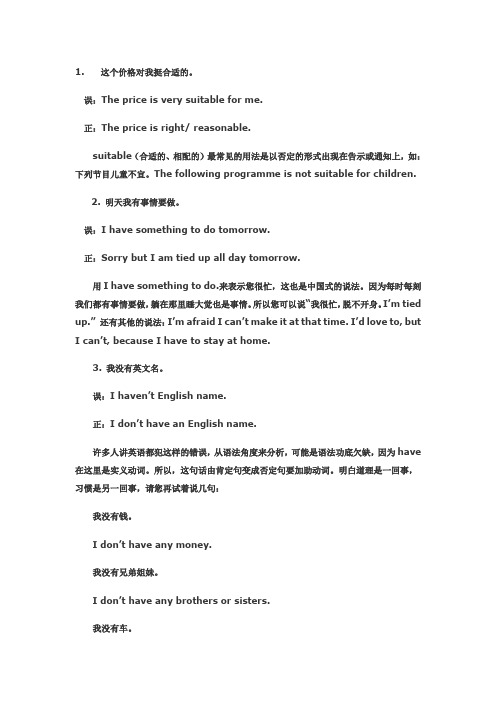
1. 这个价格对我挺合适的。
误:The price is very suitable for me.正:The price is right/ reasonable.suitable(合适的、相配的)最常见的用法是以否定的形式出现在告示或通知上,如:下列节目儿童不宜。
The following programme is not suitable for children.2. 明天我有事情要做。
误:I have something to do tomorrow.正:Sorry but I am tied up all day tomorrow.用I have something to do.来表示您很忙,这也是中国式的说法。
因为每时每刻我们都有事情要做,躺在那里睡大觉也是事情。
所以您可以说“我很忙,脱不开身。
I’m tied up.” 还有其他的说法:I’m afraid I can’t make it at that time. I’d love to, but I can’t, because I have to stay at home.3. 我没有英文名。
误:I haven’t English name.正:I don’t have an English name.许多人讲英语都犯这样的错误,从语法角度来分析,可能是语法功底欠缺,因为have 在这里是实义动词。
所以,这句话由肯定句变成否定句要加助动词。
明白道理是一回事,习惯是另一回事,请您再试着说几句:我没有钱。
I don’t have any money.我没有兄弟姐妹。
I don’t have any brothers or sisters.我没有车。
I don’t have a car.4. 我想我不行。
误:I think I can’t.正:I don’t think I can.这一组仍然是个习惯问题,在语法上称为否定前置,这就是汉语里面说“我想我不会”的时候,英语里面总是说“我不认为我会”。
英语易错谚语
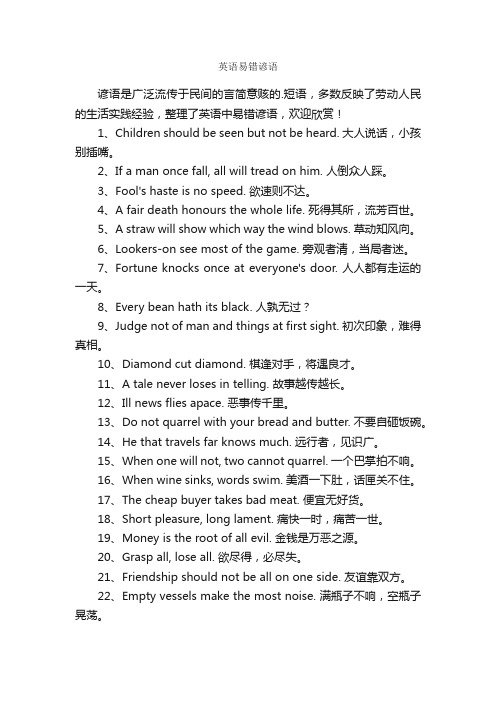
英语易错谚语谚语是广泛流传于民间的言简意赅的.短语,多数反映了劳动人民的生活实践经验,整理了英语中易错谚语,欢迎欣赏!1、Children should be seen but not be heard. 大人说话,小孩别插嘴。
2、If a man once fall, all will tread on him. 人倒众人踩。
3、Fool's haste is no speed. 欲速则不达。
4、A fair death honours the whole life. 死得其所,流芳百世。
5、A straw will show which way the wind blows. 草动知风向。
6、Lookers-on see most of the game. 旁观者清,当局者迷。
7、Fortune knocks once at everyone's door. 人人都有走运的一天。
8、Every bean hath its black. 人孰无过?9、Judge not of man and things at first sight. 初次印象,难得真相。
10、Diamond cut diamond. 棋逢对手,将遇良才。
11、A tale never loses in telling. 故事越传越长。
12、Ill news flies apace. 恶事传千里。
13、Do not quarrel with your bread and butter. 不要自砸饭碗。
14、He that travels far knows much. 远行者,见识广。
15、When one will not, two cannot quarrel. 一个巴掌拍不响。
16、When wine sinks, words swim. 美酒一下肚,话匣关不住。
17、The cheap buyer takes bad meat. 便宜无好货。
英语俗语俚语
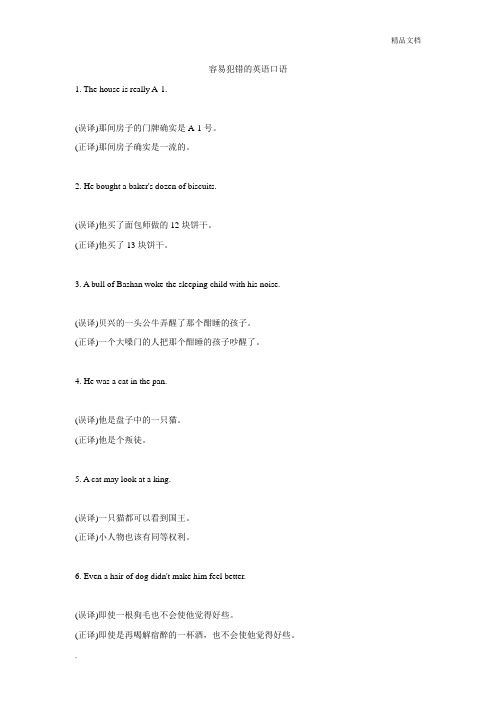
容易犯错的英语口语1. The house is really A-1.(误译)那间房子的门牌确实是A-1号。
(正译)那间房子确实是一流的。
2. He bought a baker's dozen of biscuits.(误译)他买了面包师做的12块饼干。
(正译)他买了13块饼干。
3. A bull of Bashan woke the sleeping child with his noise.(误译)贝兴的一头公牛弄醒了那个酣睡的孩子。
(正译)一个大嗓门的人把那个酣睡的孩子吵醒了。
4. He was a cat in the pan.(误译)他是盘子中的一只猫。
(正译)他是个叛徒。
5. A cat may look at a king.(误译)一只猫都可以看到国王。
(正译)小人物也该有同等权利。
6. Even a hair of dog didn't make him feel better.(误译)即使一根狗毛也不会使他觉得好些。
(正译)即使是再喝解宿醉的一杯酒,也不会使他觉得好些。
7. Is he a Jonah?(误译)他就是叫约拿吗?(正译)他是带来厄运的人吗?8. Jim is fond of a leap in the dark.(误译)吉姆喜欢在黑暗处跳跃。
(正译)吉姆喜欢冒险行事。
9. A little bird told me the news.(误译)一只小鸟将此消息告诉我。
(正译)消息灵通的人士将此消息告诉我。
10. Angela is a man of a woman.(误译)安吉拉是个有妇之夫。
(正译)安吉拉是个像男人的女人。
11. Nellie is a man of his word.(误译)内莉是他所说的那个人。
(正译)内莉是个守信用的人。
12. He paid a matter of 1000 yuan.(误译)他付了1000元的货物账。
(正译)他大约付了1000元。
英语作文中常出现的10个错误
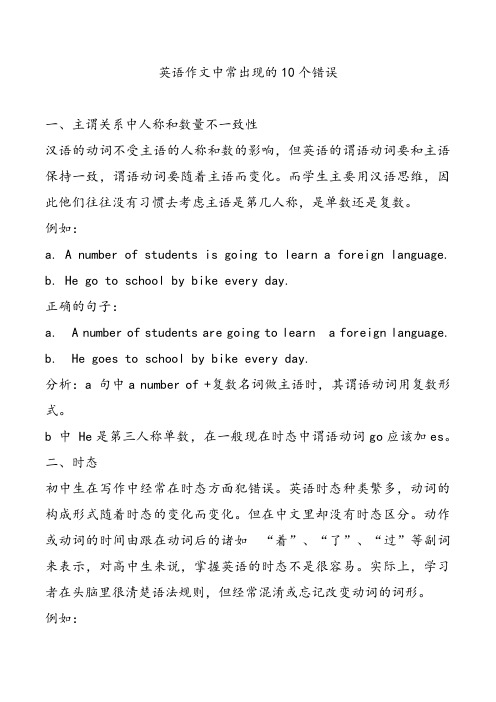
英语作文中常出现的10个错误一、主谓关系中人称和数量不一致性汉语的动词不受主语的人称和数的影响,但英语的谓语动词要和主语保持一致,谓语动词要随着主语而变化。
而学生主要用汉语思维,因此他们往往没有习惯去考虑主语是第几人称,是单数还是复数。
例如:a. A number of students is going to learn a foreign language.b. He go to school by bike every day.正确的句子:a. A number of students are going to learn a foreign language.b. He goes to school by bike every day.分析:a 句中a number of +复数名词做主语时,其谓语动词用复数形式。
b 中 He是第三人称单数,在一般现在时态中谓语动词go应该加es。
二、时态初中生在写作中经常在时态方面犯错误。
英语时态种类繁多,动词的构成形式随着时态的变化而变化。
但在中文里却没有时态区分。
动作或动词的时间由跟在动词后的诸如“着”、“了”、“过”等副词来表示,对高中生来说,掌握英语的时态不是很容易。
实际上,学习者在头脑里很清楚语法规则,但经常混淆或忘记改变动词的词形。
例如:a. A baby can cry as soon as it was born.b. I spend 50 yuan buying the clothes.c. I will not come here if it will rain tomorrow.正确的句子:a. A baby can cry as soon as it is born.b. I spent 50 yuan buying the clothes.c. I will not come here if it rains tomorrow.分析:第一句是一个常识问题,应该用一般现在时态。
英语口语容易犯错的十种情况

英语口语容易犯错的十种情况1. 用英语怎么说?错误:How to say?正确:How do you say this in English?How to say绝对可以稳居中国式英语的TOP TEN之首,在各大英语角泛滥成灾。
记住how to say只能作为一个句子里的一部分,不可以单独出现!2. 明天我有事儿。
错误:I have something to do tomorrow.正确:Sorry but I am tied up all day tomorrow.明天我有事儿,言外之意是我很忙。
可是外国人听不懂这弦外之音,就您明天有事情要做啊?谁没事儿啊?躺在那里睡大觉也是事儿。
所以您想表达很忙、无法脱身的时候,就直接说吧!I'm tied up.I'm afraid I can't make it at that time.I'd love to, but I can't. I have to stay at home.3. 我想我不行。
错误:I think I can't.正确:I don't think I can.英语的否定前置和汉语的习惯也大不相同。
汉语里面说“我想我不会”的时候,英语里面总是说“我不认为我会”。
4. 我的舞跳得不好。
错误:I don’t dance well.正确:I am not a very good dancer.当我们说不擅长做什么事情的时候,英语里面通常用not good at something。
5. 现在几点了?错误:What time is it now?正确:What time is it, please?纳尼?从小学就说的What time is it now也有毛病?!其实,讲英语的时候没有必要说now,因为您不可能问昨天的时间也不可能问刚才的时间。
而且一般现在时就已经代表了now的意思了。
英语短语容易误解的10个句子

英语短语容易误解的10个句子英语短语容易误解的10个句子1. Do you have matches?最近我有一次机会登上一艘豪华游轮观光。
我在酒吧台拿了两杯鸡尾酒回房间享受,途中遇到一位女士,她看看我后笑着说:"You have matches?"我一愣,回答说:“很抱歉,我十五年前就戒烟了,所以没有火柴。
”她立刻会意到我误解了她的意思,好像是有点抱歉地说:"It's a joke."然后,除了尴尬就没有然后了。
事后和朋友在吃晚饭的时候聊天,我趁机向一个美国朋友请教白天的那句话,他解释说:“因为她看你两手都占着,就故意开玩笑跟你要火柴,这是个非常普通的笑话,其实是想问你需不需要帮忙。
”2. Turn the table一位亲戚和妻子失和到了要离婚的地步。
几天前接到亲戚电话,说他们在走进律师楼之前,先去求助于心理和婚姻问题专家。
夫妇俩心平气和地坐下来谈了好多次,互相之间多了份理解,少了一份猜疑、埋怨,结果化干戈为玉帛。
说简单也简单,就这么拯救了这场婚姻。
我打心眼里为他们高兴,把这一消息告诉了同样也认识他们的一位美国朋友。
这位朋友很激动,还补了一句:"He turned the table"。
这话让我心里很不舒服,她是指我亲戚动粗吗?直到朋友以另一种方法向我解释,她是说我亲戚“扭转了局面”,那table和我想到的“桌子”根本无关。
turn the tables (on someone) = to suddenly take a positionof strength or advantage that was formerly held by someone else(反败为胜,转弱为强)例句:She played badly in the first set, but then she turned thetables on her opponent and won the match。
英语翻译易犯错误的50个例子

翻译易错的50个例子1. cabinet photograph例句:Is the cabinet photograph well taken?误译:这张全体内阁成员的合影拍得好吗?原意:这张六英寸照片拍得好吗?说明:cabinet photograph (合成名词) 是"六英寸照片"之意。
2. cakes and ale例句:She fully enjoyed cakes and ale。
误译:她充分地享用了蛋糕和啤酒。
原意:她尽享了人生乐趣。
说明:cakes and ale 意为"人生乐趣(事)". (此语出自莎士比亚著作Twelfth Night<<第十二夜>>)。
3. call例句:He has no call to flare up。
误译:他没有发怒大叫。
原意:他没有必要发怒。
说明:本例的call (名词),意为"必要","理由". 作此解时一般用于否定句和疑问句。
4. call one names例句:My grandpa told me not to call him names。
误译:我爷爷告诉我不要叫他的名字。
原意:我爷爷叫我不要骂他。
说明:call one names 意为"辱骂某人",用于口语. 值得注意的是,one一定要用宾格,而不是所有格,即不是one's."names" 一定是复数"names", 否则就不是此意. 如上例,若该成Mygrandpa told me notto callhis name. 则是"我爷爷叫我不要叫他的名字". call one's name中的name根据情况,可用单数和复数。
5. can例句:Buy up all the pineapples! We can can them。
英语常出现的错误总结归纳
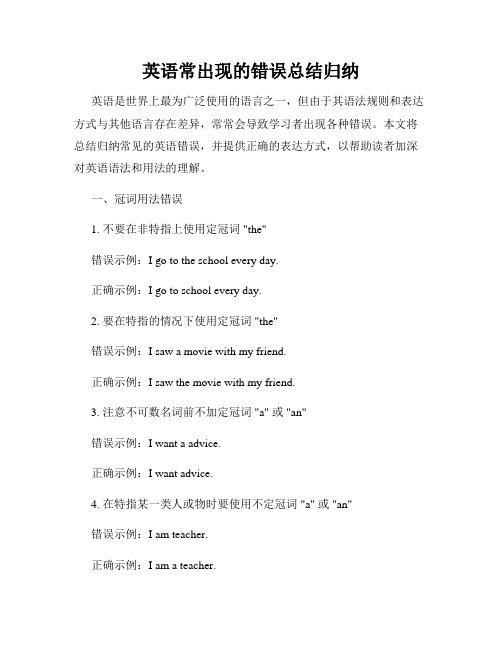
英语常出现的错误总结归纳英语是世界上最为广泛使用的语言之一,但由于其语法规则和表达方式与其他语言存在差异,常常会导致学习者出现各种错误。
本文将总结归纳常见的英语错误,并提供正确的表达方式,以帮助读者加深对英语语法和用法的理解。
一、冠词用法错误1. 不要在非特指上使用定冠词 "the"错误示例:I go to the school every day.正确示例:I go to school every day.2. 要在特指的情况下使用定冠词 "the"错误示例:I saw a movie with my friend.正确示例:I saw the movie with my friend.3. 注意不可数名词前不加定冠词 "a" 或 "an"错误示例:I want a advice.正确示例:I want advice.4. 在特指某一类人或物时要使用不定冠词 "a" 或 "an"错误示例:I am teacher.正确示例:I am a teacher.二、时态和语态错误1. 使用一般过去时表示现在的动作错误示例:Yesterday, I go to the library.正确示例:Yesterday, I went to the library. 2. 使用现在进行时表示未来的动作错误示例:I am meeting my friend tomorrow.正确示例:I will meet my friend tomorrow.3. 使用被动语态时要注意动词形式的变化错误示例:The cake made by me.正确示例:The cake was made by me.三、动词形式错误1. 不要在动词后面加 "-s" 形成复数形式错误示例:He go to school every day.正确示例:He goes to school every day.2. 使用不正确的动词时态错误示例:I have went to the supermarket.正确示例:I have gone to the supermarket.3. 不要忽略动词不定式 "to"错误示例:I want go home.正确示例:I want to go home.四、形容词和副词的用法错误1. 不要使用形容词修饰动词错误示例:He speaks English good.正确示例:He speaks English well.2. 不要使用形容词修饰名词错误示例:I have a happy news to tell you.正确示例:I have happy news to tell you.3. 注意副词在句中的位置错误示例:I always late for school.正确示例:I am always late for school.五、介词用法错误1. 注意介词的正确搭配错误示例:I am interested in for learning English.正确示例:I am interested in learning English.2. 介词后使用动词原形错误示例:I am good at to play basketball.正确示例:I am good at playing basketball.六、固定搭配和习惯用语错误1. 注意习惯用语的正确使用错误示例:I made my homework.正确示例:I did my homework.2. 注意固定搭配的正确表达方式错误示例:I go to the bed.正确示例:I go to bed.七、词汇使用错误1. 不要使用同音异义词错误替换错误示例:I read a new book yesterday.正确示例:I read a new newspaper yesterday.2. 注意动词和名词的不同用法错误示例:I have a look to the picture.正确示例:I take a look at the picture.综上所述,英语学习中常见的错误包括冠词用法错误、时态和语态错误、动词形式错误、形容词和副词的用法错误、介词用法错误、固定搭配和习惯用语错误以及词汇使用错误等。
生活中易犯的英语错误
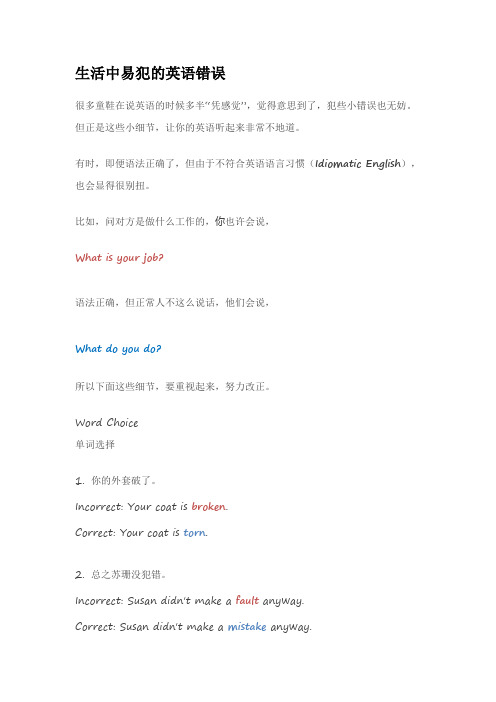
生活中易犯的英语错误很多童鞋在说英语的时候多半“凭感觉”,觉得意思到了,犯些小错误也无妨。
但正是这些小细节,让你的英语听起来非常不地道。
有时,即便语法正确了,但由于不符合英语语言习惯(Idiomatic English),也会显得很别扭。
比如,问对方是做什么工作的,你也许会说,What is your job?语法正确,但正常人不这么说话,他们会说,What do you do?所以下面这些细节,要重视起来,努力改正。
Word Choice单词选择1. 你的外套破了。
Incorrect: Your coat is broken.Correct: Your coat is torn.2. 总之苏珊没犯错。
Incorrect: Susan didn't make a fault anyway.Correct: Susan didn't make a mistake anyway.3. 能借你电话用下吗?Incorrect: May I borrow your phone?Correct: May I use your phone?4. 他有所好转。
Incorrect: He becomes better.Correct: He got better.5. 外面天还亮。
Incorrect: It was still bright outside.Correct: It was still light outside.6. 在美国一般学生都不穿校服。
Incorrect: Common students in U.S. don't wear a uniform. Correct: The average students in U.S. don't wear a uniform.7. 这道色拉是谁做的?Incorrect: Who cooked this salad?Correct: Who made this salad?8. 让我给你把把脉。
中国人翻译时最易犯错的30句英语
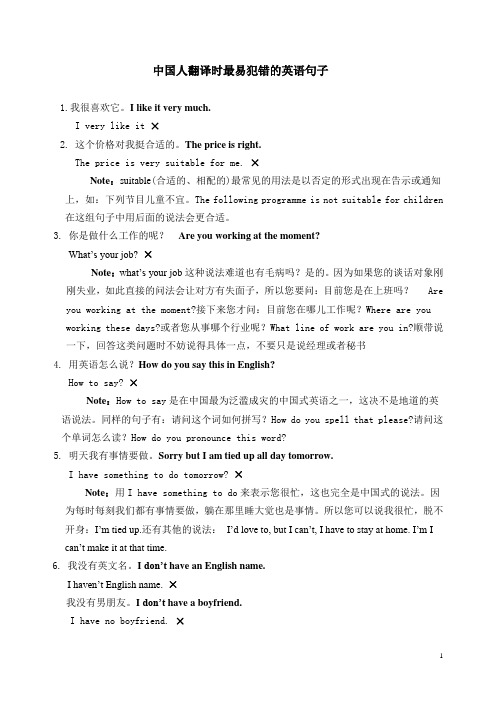
中国人翻译时最易犯错的英语句子1.我很喜欢它。
I like it very much.I very like it×2. 这个价格对我挺合适的。
The price is right.The price is very suitable for me. ×Note:suitable(合适的、相配的)最常见的用法是以否定的形式出现在告示或通知上,如:下列节目儿童不宜。
The following programme is not suitable for children 在这组句子中用后面的说法会更合适。
3. 你是做什么工作的呢?Are you working at the moment?What’s your job? ×Note:what’s your job这种说法难道也有毛病吗?是的。
因为如果您的谈话对象刚刚失业,如此直接的问法会让对方有失面子,所以您要问:目前您是在上班吗? Are you working at the moment?接下来您才问:目前您在哪儿工作呢?Where are you working these days?或者您从事哪个行业呢?What line of work are you in?顺带说一下,回答这类问题时不妨说得具体一点,不要只是说经理或者秘书4. 用英语怎么说?How do you say this in English?How to say? ×Note:How to say是在中国最为泛滥成灾的中国式英语之一,这决不是地道的英语说法。
同样的句子有:请问这个词如何拼写?How do you spell that please?请问这个单词怎么读?How do you pronounce this word?5. 明天我有事情要做。
Sorry but I am tied up all day tomorrow.I have something to do tomorrow? ×Note:用I have something to do来表示您很忙,这也完全是中国式的说法。
容易让人误解的英语句子
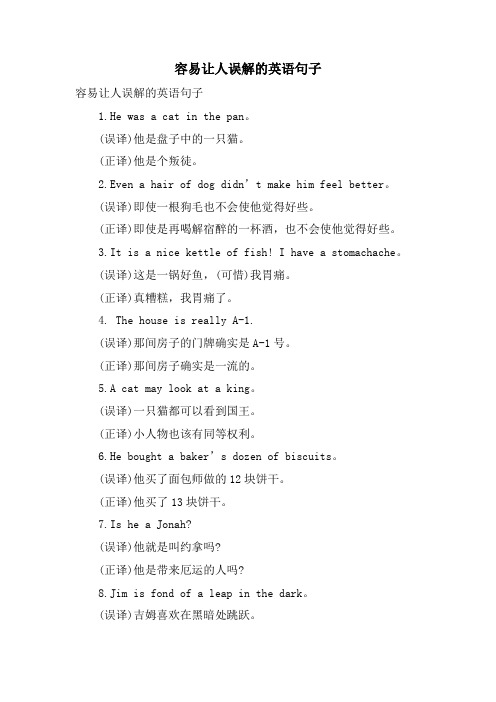
容易让人误解的英语句子容易让人误解的英语句子1.He was a cat in the pan。
(误译)他是盘子中的一只猫。
(正译)他是个叛徒。
2.Even a hair of dog didn’t make him feel better。
(误译)即使一根狗毛也不会使他觉得好些。
(正译)即使是再喝解宿醉的一杯酒,也不会使他觉得好些。
3.It is a nice kettle of fish! I have a stomachache。
(误译)这是一锅好鱼,(可惜)我胃痛。
(正译)真糟糕,我胃痛了。
4. The house is really A-1.(误译)那间房子的门牌确实是A-1号。
(正译)那间房子确实是一流的。
5.A cat may look at a king。
(误译)一只猫都可以看到国王。
(正译)小人物也该有同等权利。
6.He bought a baker’s dozen of biscuits。
(误译)他买了面包师做的12块饼干。
(正译)他买了13块饼干。
7.Is he a Jonah?(误译)他就是叫约拿吗?(正译)他是带来厄运的人吗?8.Jim is fond of a leap in the dark。
(误译)吉姆喜欢在黑暗处跳跃。
(正译)吉姆喜欢冒险行事。
9.A little bird told me the news。
(误译)一只小鸟将此消息告诉我。
(正译)消息灵通的人士将此消息告诉我。
10.Angela is a man of a woman。
(误译)安吉拉是个有妇之夫。
(正译)安吉拉是个像男人的女人。
11.Nellie is a man of his word。
(误译)内莉是他所说的那个人。
(正译)内莉是个守信用的人。
12.He paid a matter of 1000 yuan。
(误译)他付了1000元的货物账。
(正译)他大约付了1000元。
13.A bull of Bashan woke the sleeping child with his noise。
中国人最容易犯错的句英语
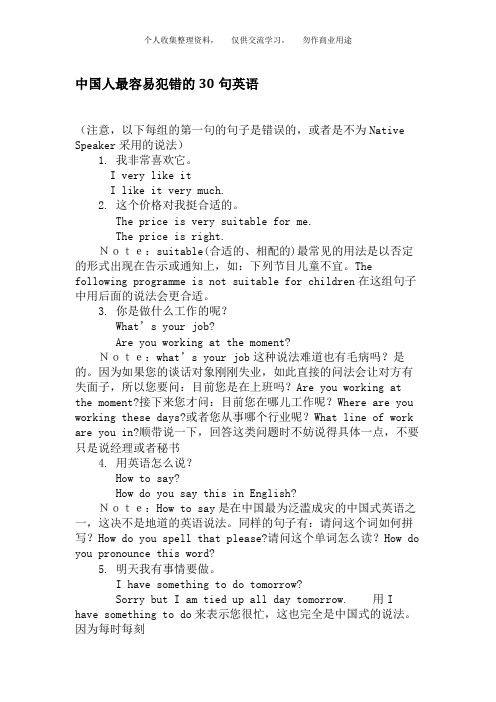
中国人最容易犯错的30句英语(注意,以下每组的第一句的句子是错误的,或者是不为Native Speaker采用的说法)1. 我非常喜欢它。
I very like itI like it very much.2. 这个价格对我挺合适的。
The price is very suitable for me.The price is right.Note:suitable(合适的、相配的)最常见的用法是以否定的形式出现在告示或通知上,如:下列节目儿童不宜。
The following programme is not suitable for children在这组句子中用后面的说法会更合适。
3. 你是做什么工作的呢?What’s your job?Are you working at the moment?Note:what’s your job这种说法难道也有毛病吗?是的。
因为如果您的谈话对象刚刚失业,如此直接的问法会让对方有失面子,所以您要问:目前您是在上班吗?Are you working at the moment?接下来您才问:目前您在哪儿工作呢?Where are you working these days?或者您从事哪个行业呢?What line of work are you in?顺带说一下,回答这类问题时不妨说得具体一点,不要只是说经理或者秘书4. 用英语怎么说?How to say?How do you say this in English?Note:How to say是在中国最为泛滥成灾的中国式英语之一,这决不是地道的英语说法。
同样的句子有:请问这个词如何拼写?How do you spell that please?请问这个单词怎么读?How do you pronounce this word?5. 明天我有事情要做。
I have something to do tomorrow?Sorry but I am tied up all day tomorrow. 用I have something to do来表示您很忙,这也完全是中国式的说法。
英语初中典型错句总结归纳
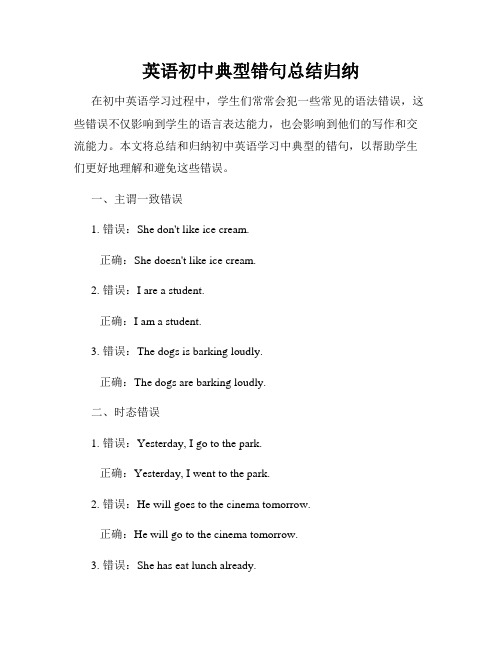
英语初中典型错句总结归纳在初中英语学习过程中,学生们常常会犯一些常见的语法错误,这些错误不仅影响到学生的语言表达能力,也会影响到他们的写作和交流能力。
本文将总结和归纳初中英语学习中典型的错句,以帮助学生们更好地理解和避免这些错误。
一、主谓一致错误1. 错误:She don't like ice cream.正确:She doesn't like ice cream.2. 错误:I are a student.正确:I am a student.3. 错误:The dogs is barking loudly.正确:The dogs are barking loudly.二、时态错误1. 错误:Yesterday, I go to the park.正确:Yesterday, I went to the park.2. 错误:He will goes to the cinema tomorrow.正确:He will go to the cinema tomorrow.3. 错误:She has eat lunch already.正确:She has eaten lunch already.三、冠词错误1. 错误:I want a apple.正确:I want an apple.2. 错误:Can you give me the newspaper?正确:Can you give me a newspaper?3. 错误:He is in the school today.正确:He is at school today.四、介词错误1. 错误:I am good in math.正确:I am good at math.2. 错误:He is waiting on the bus stop.正确:He is waiting at the bus stop.3. 错误:She is angry with me on my lateness.正确:She is angry with me about my lateness.五、动词用法错误1. 错误:I want to drink water.正确:I want to drink some water.2. 错误:They are all very interesting in playing volleyball.正确:They are all very interested in playing volleyball.3. 错误:I can to swim.正确:I can swim.六、连词错误1. 错误:I like playing basketball, or to play soccer.正确:I like playing basketball, but I don't like playing soccer.2. 错误:He didn't come to school yesterday because he was sick.正确:He didn't come to school yesterday because of his illness.七、代词错误1. 错误:He is going to the park, and he bring his friend with us.正确:He is going to the park, and he is bringing his friend with him.2. 错误:My sister and me are going to the party.正确:My sister and I are going to the party.八、语态错误1. 错误:The window is broken by him.正确:He broke the window.2. 错误:The cake was made by my mother yesterday.正确:My mother made the cake yesterday.以上是初中英语学习中常见的典型错句的总结归纳。
犯错的英文谚语
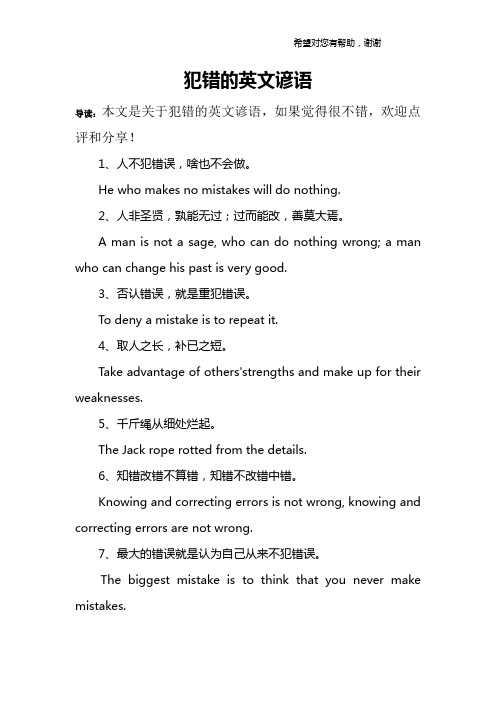
犯错的英文谚语导读:本文是关于犯错的英文谚语,如果觉得很不错,欢迎点评和分享!1、人不犯错误,啥也不会做。
He who makes no mistakes will do nothing.2、人非圣贤,孰能无过;过而能改,善莫大焉。
A man is not a sage, who can do nothing wrong; a man who can change his past is very good.3、否认错误,就是重犯错误。
To deny a mistake is to repeat it.4、取人之长,补已之短。
Take advantage of others'strengths and make up for their weaknesses.5、千斤绳从细处烂起。
The Jack rope rotted from the details.6、知错改错不算错,知错不改错中错。
Knowing and correcting errors is not wrong, knowing and correcting errors are not wrong.7、最大的错误就是认为自己从来不犯错误。
The biggest mistake is to think that you never make mistakes.8、取百家之长,补自家之短。
Take the advantages of a hundred families and make up for the shortcomings of one's own.9、有错不改,好比下雨背干柴。
It's like raining and backing up firewood.10、一位学者的错误,就象一只失事的船,它将使很多人遭难。
A scholar's mistake, like a wrecked ship, will cause many people suffering.11、小雨能够漫坏大路。
- 1、下载文档前请自行甄别文档内容的完整性,平台不提供额外的编辑、内容补充、找答案等附加服务。
- 2、"仅部分预览"的文档,不可在线预览部分如存在完整性等问题,可反馈申请退款(可完整预览的文档不适用该条件!)。
- 3、如文档侵犯您的权益,请联系客服反馈,我们会尽快为您处理(人工客服工作时间:9:00-18:30)。
生活英语中常犯错的十个句子
1. 这个价格对我挺合适的。
误:The price is very suitable for me.
正:The price is right/ reasonable.
suitable(合适的、相配的)最常见的用法是以否定的形式出现在告示或通知上,如:下列节目儿童不宜。
The following programme is not suitable for children.
2. 明天我有事情要做。
误:I have something to do tomorrow.
正:Sorry but I am tied up all day tomorrow.
用I have something to do.来表示您很忙,这也是中国式的说法。
因为每时每刻我们都有事情要做,躺在那里睡大觉也是事情。
所以您可以说“我很忙,脱不开身。
I’m tied up.” 还有其他的说法:I’m afraid I can’t make it at that time. I’d love to, but I can’t, because I have to stay at home.
3. 我没有英文名。
误:I haven’t English name.
正:I don’t have an English name.
许多人讲英语都犯这样的错误,从语法角度来分析,可能是语法功底欠缺,因为have 在这里是实义动词。
所以,这句话由肯定句变成否定句要加助动词。
明白道理是一回事,习惯是另一回事,请您再试着说几句:
我没有钱。
I don’t have any money.
我没有兄弟姐妹。
I don’t have any brothe rs or sisters.
我没有车。
I don’t have a car.
4. 我想我不行。
误:I think I can’t.
正:I don’t think I can.
这一组仍然是个习惯问题,在语法上称为否定前置,这就是汉语里面说“我想我不会”的时候,英语里面总是说“我不认为我会”。
以后您在说类似的英语句子时,只要您留心,也会习惯英语的说法的。
5. 我的英语很糟糕。
误:My English is poor.
正:I am not 100% fluent, but at least I am improving.
有人开玩笑说,全中国人最擅长的一句英文是:My English is poor. 说实话,还从来没有听到一个美国人说:My Chinese is poor. 无论他们的汉语是好是坏,他们会说:I am st ill having a few problems, but I’m getting better.
6. 用英语怎么说?
误:How to say?
正:How do you say this in English?
提示:How to say是在中国最为泛滥成灾的中国式英语之一,这绝不是地道的英语说法。
同样的句子有:How do you spell that, please?(请问这个词如何拼写?)How do you pronounce this word?(请问这个单词怎么读?)
7. 你愿意参加我们的晚会吗?
误:Would you like to join our party?
正:Would you like to come to our party?
join 往往是指参加俱乐部或者协会,如:join a health club; join the
Communist Party 。
事实上,常常与party 搭配的动词是come 或者go 。
如go to a wild party ,或者come to a Christmas Party 。
8. 我没有经验。
误:I have no experience.
正:I am afraid I don’t know much about that .
I have no experience. 这句话听起来古里古怪,因为您只需要说:那方面我懂得不多,或者这方面我不在行,就行了。
I am not really an expert in this area.
9. 他的身体很健康。
误:His body is healthy.
正:He is in good health.或者He’s healthy.
在英语中,“健康”是“人健康”,而我们汉语中则说“身体健康”。
在这个问题上不能用汉语的思维去套英语的表达。
10. 别理她。
误:Don’t pay attention to her.
正:Leave her alone.
虽然 pay attention to 是“注意”的意思,但是“别理某人”可不是“不注意某人”的意思,而是“别去打扰/招惹某人”,英语中的习惯表达法就是 leave somebody alone 。
索创在线英语 /。
